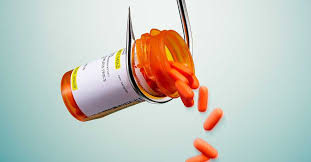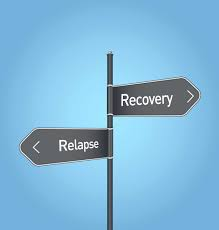How To Prevent Prescription Drug Relapse
Immediate
Placement Available at our Top-Rated Treatment Centers.
Please call us at (855) 410-4488. We work
with most major insurance providers and offer flexible payment
options!
Atrium Addiction Care offers a variety of treatment choices and programs for individuals struggling with drug or alcohol addiction. Our inpatient treatment programs are designed for those who have more severe substance use problems and require 24-hour care. We admit both voluntary and involuntary patients.

Prescription drug addiction is a serious issue that affects millions of people around the world. Once an individual has successfully completed their detoxification and rehabilitation programs, they are faced with a new set of challenges: staying sober and preventing relapse.
Even though it can be challenging to maintain sobriety after completing a treatment program, there are several strategies and resources available to help prevent prescription drug relapse. In this article, we will explore various ways to prevent prescription drug relapse.
We will discuss why using relapse prevention skills is crucial in maintaining sobriety, identify common triggers for relapse and offer practical tips on how individuals can stay focused on their recovery goals. Additionally, we will provide information about resources such as support groups that can aid in long-term success in overcoming addiction.
Understanding The Nature Of Prescription Drug Addiction - addiction treatment
Prescription drug addiction is a complex and chronic condition that can have adverse effects on an individual's physical, psychological, and social well-being. Several factors contribute to the development of prescription drug addiction, such as genetic predisposition, environmental stressors, mental health disorders, and prolonged medication use.
Symptoms of prescription drug addiction may vary depending on the type of medication abused but commonly include intense cravings for drugs, inability to control drug use, withdrawal symptoms when not using the drug or alcohol use of drugs, and neglecting personal responsibilities.
Effective treatment options for prescription drug addiction aim to address both the physical and psychological aspects of addiction. Treatment plans often involve detoxification programs followed by behavioral therapies such as cognitive-behavioral therapy (CBT), motivational interviewing (MI), or contingency management (CM).
These therapies help individuals develop coping skills to manage triggers and avoid relapse. In some cases where co-occurring mental health conditions are present, medications may be prescribed alongside other forms of treatment.
Withdrawal from prescription drugs can result in several unpleasant side effects such as nausea/vomiting, diarrhea, anxiety/depression, insomnia/fatigue amongst others. Long-term abuse of prescription drugs has been associated with severe health risks such as heart attacks/strokes/organ failure leading to death.
Substance abuse also takes a toll on relationships causing mistrusts between family members/socio-economic problems/loss of job opportunities etcetera. In summary, understanding the causes and symptoms of prescription drug addiction is crucial in preventing relapse.
Effective treatment options that incorporate behavioral therapies along with pharmacological treatments play a vital role in achieving long-lasting recovery from substance use disorders and abuse disorders without experiencing significant withdrawal complications or long term health risks while improving interpersonal relationships with loved ones.
Identifying Triggers And High-Risk Situations

Identifying Triggers and High-Risk Situations is an integral part of preventing prescription drug relapse. A trigger refers to any stimulus that prompts a person to engage in substance use, whereas high-risk situations are those scenarios that increase the likelihood of drug or substance use disorder. Coping strategies play a crucial role in dealing with triggers and high-risk situations.
Environmental cues refer to certain settings or objects associated with previous drug or alcohol abuse experiences that can serve as a trigger for individuals recovering from addiction. Identifying and avoiding such environmental cues could help prevent relapse.
Stress management techniques like meditation, deep breathing exercises, or yoga may also be helpful in managing cravings triggered by anxiety-inducing events.
Emotional regulation is another important aspect of identifying triggers and high-risk situations. Many people who struggle with addiction have underlying emotional issues that they try to cope with through substance use. Learning how to identify, express, and regulate emotions effectively can reduce the risk of turning to drugs when experiencing intense feelings.
Relapse and relapse prevention tools and techniques like identifying warning signs early on, having a support system, practicing self-care activities regularly can also aid in maintaining long-term sobriety without relapsing into old habits.
Building A Support System For Long-Term Recovery
Building a support system is an essential component of long-term recovery from prescription drug addiction. Community involvement early recovery can play a crucial role in this process, as it provides individuals with access to resources and networks that aid in their recovery journey.
Attending local community events or joining groups focused on healthy lifestyles are good ways to start building relationships within your community.
Peer mentorship programs offer another avenue for developing connections and receiving guidance from those who have already walked the path of recovery. Such peer support and programs provide individuals with the opportunity to share experiences and learn strategies for coping with triggers and cravings. Additionally, peer mentors often act as accountability partners, providing encouragement when needed.
Self-reflection is also critical to maintaining long-term recovery. Taking time to assess one's progress and identify areas of improvement is vital in staying motivated towards sustained sobriety.
Holistic wellness practices such as mindfulness meditation, yoga, exercise, and proper nutrition can all contribute positively to self-reflection efforts. Creative expression through art therapy or music can also provide an outlet for expressing emotions constructively while promoting healing.
Overall, creating a robust support system involves cultivating social connections both inside and outside oneself. By engaging with communities, a support group seeking help from others who have gone through similar experiences, reflecting inwardly on progress made so far, incorporating holistic wellness practices into daily routine activities, people living with prescription drug addiction can establish lasting structures that promote sustained sobriety without relapse risk.
Developing Healthy Coping Mechanisms - drug or alcohol use

Prescription drug addiction can be difficult to overcome, and relapse is a common occurrence. One way to prevent relapse is by developing healthy coping mechanisms that replace the use of drugs as a means of managing stress.
Mindful meditation has been shown to be an effective tool in reducing anxiety and depression symptoms associated with substance abuse disorders. It involves focusing on the present moment while acknowledging thoughts and feelings without judgment.
Exercise therapy is another useful strategy for preventing prescription drug relapse. Regular physical activity not only improves overall health but also helps manage stress levels, reduces cravings, and enhances mood.
Creative expression through art or music can also provide individuals with an outlet for emotions and promote relaxation.
Social connection plays a crucial role in recovery from addiction, promoting a sense of belongingness, a support network, and accountability among peers. Building and maintaining healthy relationships with friends, family, and support groups can provide a sense of community and belonging, which can be crucial for long-term sobriety. Engaging in activities with others who share similar interests and values can also help to reduce feelings of isolation and loneliness.
Finally, incorporating healthy habits into daily routines such as getting enough sleep, eating nutritious foods, staying hydrated, and avoiding triggers can help maintain long-term sobriety. Developing these positive behaviors takes time and effort but can ultimately lead to improved mental health and well-being.
Staying Engaged In Treatment And Aftercare
Staying engaged in treatment and aftercare is a critical component of preventing prescription drug relapse. One effective approach is to establish accountability partnerships with loved ones or peers who can provide support, encouragement, and feedback on progress toward recovery goals. These partnerships can help individuals stay accountable for their actions while also providing an additional layer of motivation and inspiration.
Another key technique for staying engaged in treatment and aftercare is goal setting. Setting achievable goals that align with one's overall recovery plan can help maintain focus and momentum throughout the rehabilitation process. Additionally, regularly reviewing these goals and adjusting them as needed can ensure continued progress towards long-term sobriety.
Mindfulness practices are another useful tool for staying engaged in treatment and aftercare. Techniques such as meditation, yoga, deep breathing exercises, and mindfulness-based stress reduction programs have been shown to reduce stress levels, improve emotional regulation skills, increase self-awareness, and promote overall well-being. Practicing mindfulness techniques regularly can lead to greater resilience when faced with triggers or challenges associated with addiction recovery.
Self-care strategies are essential for maintaining physical health during the rehabilitation process. This includes eating healthy foods, getting regular exercise, prioritizing sufficient sleep each night, practicing good hygiene habits like showering daily or brushing teeth twice per day - all of which contribute significantly to mental wellness too!
Lastly but not least important Relapse prevention planning ensures that individuals have a concrete strategy in place if they experience any setbacks or triggers that may put them at risk of relapse or relapsing back into addictive behavior patterns without warning.
Overall, there are many different approaches people can take to stay actively involved in their addiction care journey beyond initial detoxification periods: from establishing accountability partnerships with trusted confidants; using goal-setting tactics aimed at achieving milestones within rehab regimes; incorporating mindfulness practices into everyday routines; implementing self-care measures including proper nutrition/exercise regimens along with adequate rest/sleep cycles – ultimately leading up to having comprehensive relapse prevention strategies and plans ready to go at any given moment.
Finding Hope And Renewed Purpose In Sobriety
Recovery from prescription drug addiction is a lifelong process that requires dedication and commitment. Beyond simply abstaining from drugs, individuals must find ways to maintain their sobriety while simultaneously addressing the underlying issues that led them to use drugs in the first place.
One effective strategy for preventing relapse is through mindfulness practices. This can include meditation, breathing exercises, or yoga, which help individuals manage stress and regulate their emotions.
Another powerful tool for maintaining sobriety is creative expression. Whether it be writing, art, music, or dance, engaging in a creative activity allows individuals to express themselves in a healthy way and explore new avenues of self-discovery.
Spiritual exploration can also provide a sense of purpose and meaning in recovery. This may involve exploring one's own spirituality or connecting with a higher power.
Physical activity can also play an important role in preventing relapse by improving overall health and wellbeing. Exercise has been shown to reduce stress levels as well as improve mood and cognitive function.
Finally, community involvement provides support and accountability throughout the recovery process. Joining groups such as Alcoholics Anonymous or Narcotics Anonymous enables individuals to connect with others who are going through similar experiences and gain insight into successful strategies for staying sober.
Incorporating these various strategies into daily life can greatly increase the chances of long-term success in recovery from prescription drug addiction. By finding hope and renewed purpose in sobriety through mindfulness practices, creative expression, group therapy, spiritual exploration, physical activity, and community involvement, individuals can build fulfilling lives free from the grip of addiction.
Conclusion - relapse prevention - drug abuse
Prescription drug addiction can be a challenging and complex issue to overcome. However, with the right strategies and support, it is possible to prevent relapse and achieve long-term recovery. A key component of an addiction medicine preventing relapse is understanding the nature of addiction and identifying triggers and high-risk situations that may lead to drug use.
Building a strong support system, developing healthy coping mechanisms, staying engaged in treatment and aftercare, and finding hope and renewed purpose in sobriety are all essential steps towards preventing prescription drug relapse.
By taking an active role in their own recovery journey and seeking out resources for help when needed, individuals struggling with prescription drug addiction can successfully maintain their sobriety over time. With perseverance, dedication, and a commitment to ongoing self-care, anyone can overcome addiction and live a fulfilling life free from drugs.
